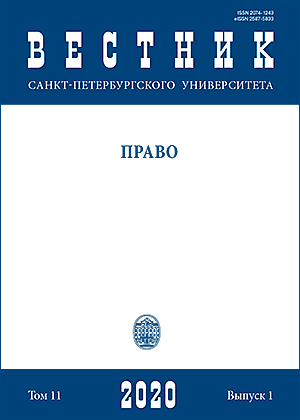Compliance as a legal instrument for minimizing risks and prevention of offences
DOI:
https://doi.org/10.21638/spbu14.2020.107Abstract
The article deals with the concept and legal significance of compliance as a system of measures taken by business entities and aimed at accounting for business risks and prevention of possible offenses. The result of entrepreneurial activity cannot be guaranteed, as it depends on a variety of external and internal factors, objective and subjective causes of manifestation, which predetermine the discussion about entrepreneurial risk, its limits and mechanisms of minimization. For discussion, the author proposes the definition of compliance as a risk management system of non-compliance of an economic entity with the rules of law and all other important factors for business. The introduction of a compliance system in the activities of an economic entity should be considered as a natural need within the framework of freedom of entrepreneurial activity, and the compliance itself as an instrument of self-control of the entrepreneur. Compliance should not be equated with the tools of administrative control. The principle of voluntary compliance dictates the voluntary implementation of the compliance system, and the mandatory application of compliance procedures should be based on a risk-based approach as a special method of organization and implementation of internal control, the severity of potential negative consequences. The criterion of mandatory application for compliance procedures may be the severity of potential negative consequences of competition, rather than the type of legal form of a legal entity or participation in its authorized capital of public entities. To do this, it is necessary to develop the principles of compliance control and on their basis to introduce appropriate procedures. Within the framework of collective actions for a group of persons, the parent company of the group of persons is obliged to ensure the unity of approaches to the organization of compliance and be responsible for ensuring its effective organization.
Keywords:
compliance, business risk, entrepreneurship, offenses, self-control, control, supervision, voluntariness and obligation of compliance control, risk-oriented approach, compliance in a group of persons
Downloads
References
Плюс». Из информационного банка «Юридическая пресса». Дата обращения 20 января, 2019. http://www.consultant.ru/cons/cgi/online.cgi?req=doc&base=CJI&n=114259#06979309333207595.
field of Antimonopoly activity. Interview with the Head of the FAS Russia I. Yu. Artemyev”. Rossiiskoe konkurentnoe pravo i ekonomika 3: 6–11. (In Russian)
Downloads
Published
How to Cite
Issue
Section
License
Articles of "Vestnik of Saint Petersburg University. Law" are open access distributed under the terms of the License Agreement with Saint Petersburg State University, which permits to the authors unrestricted distribution and self-archiving free of charge.






